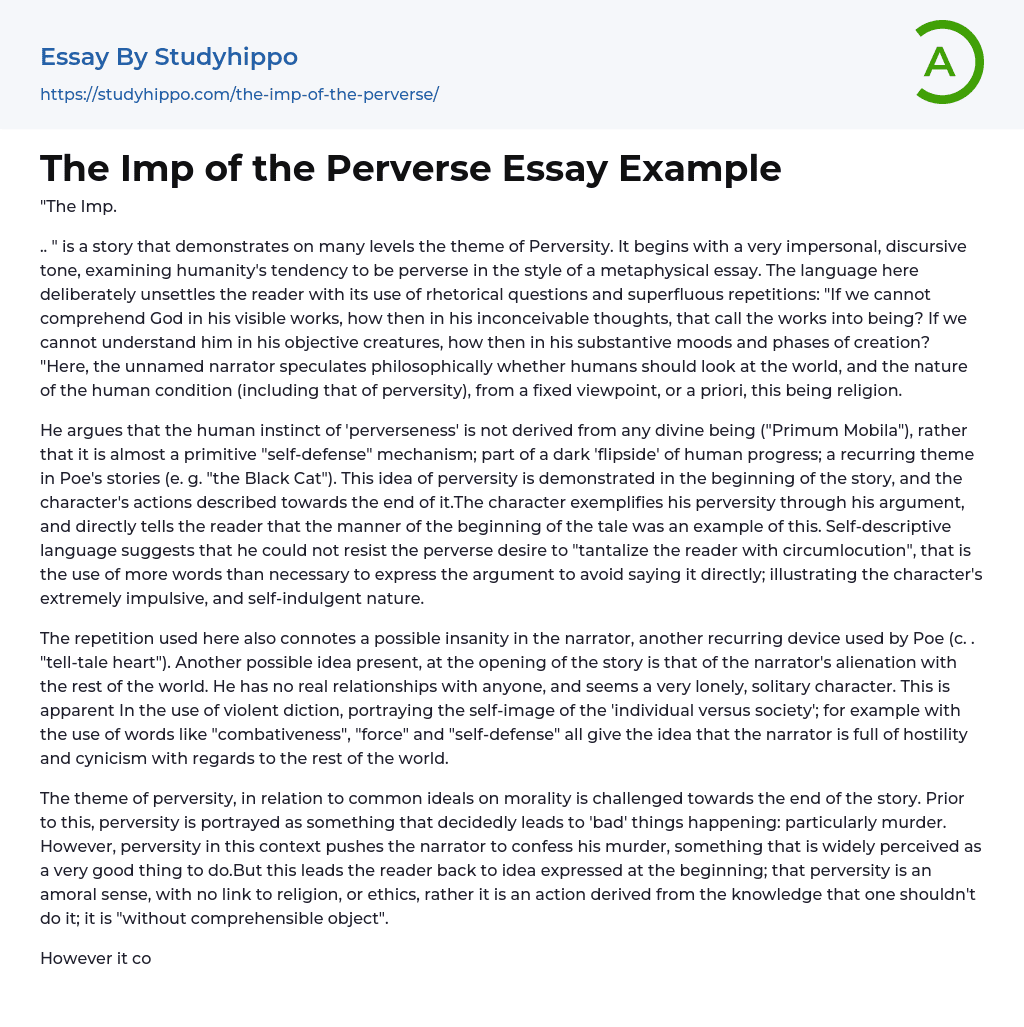"The Imp.
.. " is a story that demonstrates on many levels the theme of Perversity. It begins with a very impersonal, discursive tone, examining humanity's tendency to be perverse in the style of a metaphysical essay. The language here deliberately unsettles the reader with its use of rhetorical questions and superfluous repetitions: "If we cannot comprehend God in his visible works, how then in his inconceivable thoughts, that call the works into being? If we cannot understand him in his objective creatures, how then in his substantive moods and phases of creation? "Here, the unnamed narrator speculates philosophically whether humans should look at the world, and the nature of the human condition (including that of perversity), from a fixed viewpoint, or a priori, this being religion.
He argues that the human instinct of 'perverseness' is not derived from any di
...vine being ("Primum Mobila"), rather that it is almost a primitive "self-defense" mechanism; part of a dark 'flipside' of human progress; a recurring theme in Poe's stories (e. g. "the Black Cat"). This idea of perversity is demonstrated in the beginning of the story, and the character's actions described towards the end of it.The character exemplifies his perversity through his argument, and directly tells the reader that the manner of the beginning of the tale was an example of this. Self-descriptive language suggests that he could not resist the perverse desire to "tantalize the reader with circumlocution", that is the use of more words than necessary to express the argument to avoid saying it directly; illustrating the character's extremely impulsive, and self-indulgent nature.
The repetition used here also connotes a possible insanity in the narrator, another recurrin
device used by Poe (c. . "tell-tale heart"). Another possible idea present, at the opening of the story is that of the narrator's alienation with the rest of the world. He has no real relationships with anyone, and seems a very lonely, solitary character. This is apparent In the use of violent diction, portraying the self-image of the 'individual versus society'; for example with the use of words like "combativeness", "force" and "self-defense" all give the idea that the narrator is full of hostility and cynicism with regards to the rest of the world.
The theme of perversity, in relation to common ideals on morality is challenged towards the end of the story. Prior to this, perversity is portrayed as something that decidedly leads to 'bad' things happening: particularly murder. However, perversity in this context pushes the narrator to confess his murder, something that is widely perceived as a very good thing to do.But this leads the reader back to idea expressed at the beginning; that perversity is an amoral sense, with no link to religion, or ethics, rather it is an action derived from the knowledge that one shouldn't do it; it is "without comprehensible object".
However it could be argued that this confession does contradict perversity and that he confessed through the guilt that he could live with no longer, thus suggesting that he has now gained a sense of morals. One comparison with the story would be the "Tell Tale Heart".Again in this story the unnamed narrator displays an intelligent pragmatism, for example, in the carefulness with which both characters went about and planned their respective crimes. Both stories try to convey the
sense that they fully know what they intended to do, and put their own lack of motives down to perversity, the idea that they committed the murders because they knew they should not. A possible contrast with the stories is that the ideas about perversity are more coherently expressed by "the Imp.
.. " narrator.
- Population essays
- Cultural Assimilation essays
- Demography essays
- Ethnographic essays
- Population Growth essays
- Boo Radley essays
- Genesis essays
- Richard iii essays
- Alice in Wonderland essays
- On the road essays
- Ozymandias essays
- The Nightingale essays
- Holden Caulfield essays
- Animal Farm essays
- 1984 essays
- A Hanging essays
- Shooting An Elephant essays
- A Tale Of Two Cities essays
- Adventures Of Huckleberry Finn essays
- Arthur Conan Doyle essays
- Brave New World essays
- Characters In Hamlet essays
- Characters In Romeo And Juliet essays
- Desdemona essays
- Diary Of A Wimpy Kid essays
- First-Person Narrative essays
- Frankenstein essays
- Heart Of Darkness essays
- Jane Eyre essays
- Jay Gatsby essays
- King Duncan essays
- Librarian essays
- Little Red Riding Hood essays
- Lord Of The Flies essays
- Silas Marner essays
- The Cask Of Amontillado essays
- The Catcher In The Rye essays
- The Crucible essays
- The Handmaid's Tale essays
- The Reader essays
- Virgil essays
- Wuthering Heights essays
- Candide essays
- Castle essays
- J. D. Salinger essays
- Ulysses essays
- Ethan Frome essays
- In Cold Blood essays
- Outliers essays
- Tuesdays With Morrie essays




